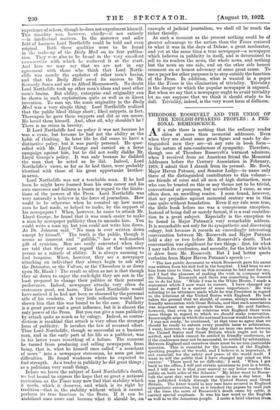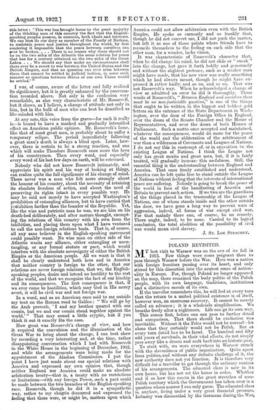THEODORE ROOSEVELT AND THE. UNION OF THE ENGLISH-SPEAKING PEOPLES :
A PER- SONAL REMINISCENCE.
AS a rule there is nothing that the ordinary reader shies at more than memorial addresses. Even when they are about some great figure and made by dis- tinguished men they are—at any rate in book form— in the nature of non-conductors of sympathy. Therefore, though one of Theodore Roosevelt's warmest admirers, when I received from an American friend the Memorial Addresses before the Century Association in February, 1919, I admit that I shrank from its perusal. Mr. Root, Major Haven Putnam, and Senator Lodge—to name only three of the distinguished contributors to this volume— are friends of mine and all men of high distinction, men who can be trusted on this or any theme not to be trivial, conventional or pompous, but nevertheless I came, as one often does, an unwilling reader. I soon found, however, that my prejudice against memorial oratory was in this case quite without foundation. Even if my rule were true, the little book before me was a conspicuous exception. Instead of being dull or merely formal, it is a real contribu- tion to a great subject. Especially is the exception to be found in Major Putnam's very remarkable address. It is remarkable not only for its sympathetic and discerning eulogy, but because it records an exceedingly interesting conversation between Mr. Roosevelt and Major Putnam held a day or two before Mr. Roosevelt's death. That conversation was significant for two things : first, for what I may call its confession, and secondly, for the letter which it drew from Mr. Roosevelt. But I had better quote verbatim from Major Haven Putnam's speech :— " The last public document to which Roosevelt gave his name was written from his sick bed in the hospitaL I had been to see him from time to time, but on this occasion he had sent for me, and I had the pleasure of making the visit in company with Dr. Manning. Roosevelt said there was something he wanted me to do for him. ' While I was in the White House, I made a statement which I now want to correct. I have changed my mind in regard to a matter of some importance.' He was referring to an utterance made while he was President in regard to the relations of the United States with England. He had taken the ground that we should, of course, always maintain a friendly association with Great Britain, and that such association was important on more grounds than one. He said further, however, that even in our relations with England there were some things in regard to which we Should make reservation. Issues might arise in which the national honour would be involved. I was not ready,' he continued, ' at that time to agree that we should be ready to submit every possible issue to arbitration. I want, however, to say to-day that no issue can arise between the United States and Great Britain which ought not to be settled, and which cannot be settled in friendly conference, or if the conference may not be successful, be settled by arbitration. Between England and ourselves there must be no non-justiciable question. This is essential for the interests of the English- speaking peoples of the world, and I believe it is important, if not essential, for the safety and peace of the world itself. I want to tell the public that I have changed my mind on this matter.' There need be no difficulty,' I said. ' When I get back to the office, I will put certain questions to you in a letter, and I will see to it that your answer to my letter reaches the public on both sides of the Atlantic.' My letter went to Roose- velt the next day, and his answer came to me a day later. It was published widely through the United States and Great Britain. The letter would in any case have secured in England sympathetic attention, but as it reached the papers by mail just at the time the news of Roosevelt's death came by cable, it carried special emphasis. It was his last word to the English as well as to the American people. I make a brief citation Iron). this letter : This war has brought home to the great majority of the thinking men of this country the fact that the English- speaking peoples possess, in common, both ideals and interests. We can best do our duty as member of the Family of Nations, to maintain peace and justice throughout the world, by first rendering it impossible that the peace between ourselves can ever be broken. , . . There is no reason why there should not be on the two sides of the Atlantic the same relation for peace that has for a century obtained on the two sides of the Great Lakes.. . . We should say that under no circumstances shall there ever bo a resort to war between the United States and the British Empire, and that no question can ever arise between them that cannot be settled in judicial fashion, in some such manner as questions between States of our own Union would be settled.' " I was, of course, aware of the letter and fully realized its significance, but it is greatly enhanced by the conversa- tion recorded above. Not only is the confession very remarkable, as also very characteristic of Mr. Roosevelt, but it shows, as I believe, a change of attitude not only in him, but in the bulk of men who can best be described as like-minded with him.
At any rate, this voice from the grave—for such it really is—is bound to have a marked and gradually intensified effect on American public opinion. Mr. Roosevelt's fame, like that of most great men, is probably about to suffer a temporary eclipse. The period immediately following a great man's death is always a blind spot. Later, how- ever, there is certain to be a strong reaction, and one which will make Theodore Roosevelt once more the hero of his countrymen. Then every word, and especially every word of his last few days on earth, will be esteemed. - Nobody who did not know Roosevelt intimately, and appreciate his spirit and his way of looking at things, can realize quite the full significance of his change of mind. There never was a man who felt more strongly about the honour of his country, about the necessity of retaining its absolute freedom of action, and about the need of preserving its rights intact in every possible way. He may be said not merely to have accepted Washington's prohibition of entangling alliances, but to have carried that prohibition farther than the founder of the Republic. Yet, like the wise and patriotic man he was, we see him on his death-bed deliberately, and after mature thought, exempt- ing the relations of this country with his own from the inhibition, and placing them upon what I have ventured to call the non-foreign relations basis. That is, of course, all any sane believer in the English-speaking movement could possibly want. No wise man on either side of the Atlantic wants any alliance, either entangling or unen- tangling, or any formal statute or pact, which would interfere with the absolute sovereignty of either the British Empire or the American people. All we want is that it shall be clearly understood both here and in America that neither country is foreign to the other, that our relations are never foreign relations, that we, the English- speaking peoples, desire and intend no hostility to the rest of the world, and that we recognize the fact of our kinship and its consequences. The first consequence is that, if we ever come to hostilities, which may God in His mercy avert, it will be civil war and not foreign war.
In a word, and as an American once said to me outside my tent on the Roman road to Galilee : " We will go by the Arab proverb, ' I and my brother quarrel with our cousin, but we and our cousin stand together against the world." That may sound a little cryptic, but if you think it out it exactly fits the case.
How great was Roosevelt's change of view, and how it required the convulsion and the illumination of the Great War to bring about the change, I can best show by recording a very interesting and, at the time, rather disappointing conversation which I had with Roosevelt in the White House in the beginning of December, 1902, and while the arrangements were being made for the appointment of the Alaskan Commission. I put the point I have just made about our special relations with America and expressed my own opinion that, though neither England nor America could make an absolute arbitration treaty—that is, a treaty with no restrictions or limitations—with any foreign Power, such a pact could be made between the two branches of the English-speaking race. Roosevelt, though he did it in a sympathetic way, rather to my chagrin demurred and expressed the feeling that there were, or might be, matters upon which America could not allow arbitration even with the British Empire. He spoke so earnestly and so frankly that, though he did not convert me, I did not push the matter, but left it as one of those points where friends have to reconcile themselves to the feeling on each side that the other man, for a wonder, lacks vision.
It was characteristic of Roosevelt's character that, when he did change his mind, he did not slide or " sneak " into the change, but gave it forth boldly and generously and without the slightest pretence, such as a weaker man might have made, that his new view was really something which he had always meant, though he might have ex- pressed it rather badly, and so on, and so on. That was not Roosevelt's way. When he acknowledged a change of view or admitted an error he did it thoroughly. Those words of Roosevelt's, " Between England and ourselves there must be no non-justiciable question," is one of the things that ought to be written in the biggest and boldest gold 'letters on the entrance of the State Department in Wash- ington, over the door of the Foreign Office in England, over the doors of the Senate Chamber and the House of Representatives, and over the doors of both Houses of Parliament. Such a motto once accepted and maintained, whatever the consequences, would do more for the peace of the world and the obliteration of the arbitrament of war than a wilderness of Covenants and Leagues of Nations. I do not say this in contempt of, or in oppcsition to, the existing League of Nations. I think the League not only has great merits and great uses, but, if it is fairly treated, will gradually increase this usefulness. Still, tha essential thing is the understanding between England and America. That once firmly established and understood, America can be left quite free to stand outside the League of Nations without feeling that the interests of international peace are suffering. Nobody is going to break the peace of the world in face of the handfasting of America and Britain to prevent such action. If we two are the guardians of the things placed in the trusteeship of the League of Nations, one of whom stands inside and the other outside the door, we have gone a long way to prevent wars of aggression, indeed, all forms of war except civil war. For that malady there can, of course, be no remedy. There ought, indeed, to be none. Carried to its logical conclusion, the total abolition of the possibility of civil war would mean civil slavery.
J. ST. Lou STRACHEY.



































 Previous page
Previous page